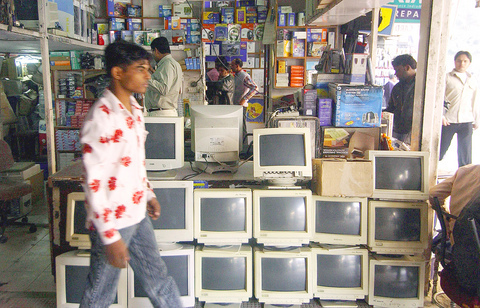Listening attentively, Winny Kao (
Kao was part of an audience eager to know how to sell their products at minimal risk in India, a rising star of the so-called BRIC (Brazil, Russia, India and China) nations with vigorous economic growth potential.
India, the world's second-most populous nation after China, could potentially sustain strong GDP growth of 8 percent for the next two years, but high oil prices could slow the pace, according to the UN's latest report.

PHOTO: AFP
"We've got to learn about the Indian market and be prepared [for any investment] to keep pace with our customers," Kao told the Taipei Times at a forum held by the Market Intelligence Center (
Giantplus, which owns plants in Taiwan and Shanghai, now supplies flat panels to mobile phone companies such as the world's No 2 handset vendor Motorola Inc.
Motorola, the US phone giant, plans to open its first factory in India within a year and a half and will sell cheap handsets at prices as low as US$35 each in the world's second-largest mobile phone market in an attempt to boost its market share.

FILE PHOTO: WANG YI-HUNG, TAIPEI TIMES
India only had 81 million cellphone users as of last year, despite having a total population of about 1 billion, according to statistics provided by the Industrial Technology Research Institute (ITRI,
Eying the growth potential, Giantplus represents in miniature the growing trend among local manufacturers of diversifying Chinese investment to India, although Taiwan's cumulative investment in India totalled less than US$20 million as of the end of last year.
From computer chipset maker VIA Technologies Inc (
"The list is long. Any company you name has the same ambition," Kao said.
Over the past two decades, Taiwanese manufacturers have built as many factories as they could in China to boost their shrinking profit margins by taking advantage of cheap labor and preferential tax schemes for foreign companies offered by Beijing.
As of last month local companies had invested US$48.17 billion in China since 1991, according to the government's latest tally. Computer makers like Quanta Computer Inc (
But things are changing.
Taiwanese have latched onto a new trend and are now carefully assessing India in a bid to capture business opportunities. At the same time, the government has also felt the need to strategically shift its focus to India as the country has emerged as an economic power in recent years.
On Feb. 11, the semi-official Taiwan-India Cooperation Council was established, with Democratic Progressive Party Chairman Yu Shyi-kun elected as chairman.
The council aims to foster ties between the two countries while reducing the risks associated with the nation's over-reliance on China's market. Meanwhile, the Ministry of Economic Affairs' Bureau of Foreign Trade also plans to organize a trade delegation visit to India this summer.
"Recently, we have arranged an increasing number of trips to southern Asia, including India, for members to scout the investment environment," said Luo Huai-jia (
This shift coincided with Beijing's decision to revoke tax preference for foreign corporations early next year. India, on the other hand, is sweetening tax incentives to boost foreign investment.
Cheap labor and a massive domestic market are two of the most important factors for corporate executives in deciding where to invest.
"India has got both. Favorable tax schemes give the southern Asian nation an upper hand in winning more foreign investors' attention," ITRI analyst Max Deng (
The Indian government recently said that it would scrap import taxes on technology products soon as well as exempting manufacturers from income tax for 10 years after opening new plants, said Deng, who just returned from a visit to India.
Foxconn International Holdings Ltd (FIH,
Following in the footsteps of its major client Nokia Oyj, Foxconn last month signed an agreement with the local government of Tamil Nadu for a 20-hectare site where it will open its first factory in India making computers and cellphones in the industrial city of Chennai, only a 15-minute trip from Nokia's factory.
"FIH's move mainly aims to provide a better service for its clients. That also improves local EMS [electronics manufacturing service] providers' chances of catching up with their international rivals in having plants globally," said Tony Tseng (
For similar reasons, Compal Communications Inc (
"Companies selling branded products, however, are eying the increasing purchasing power in India," Deng said.
According to International Data Corp's (IDC) forecast in January, India will continue to enjoy the fastest-growing domestic information technology market in the Asia Pacific region, at 19 percent this year, outpacing even China, which would expand at 12 percent.
Taiwanese mobile phone vendor BenQ Corp (明基) said last week that it planned to sell own-brand liquid-crystal-display (LCD) monitors in India after gaining a foothold in the handset market there.
Dopod International Corp (
The company will target high-end phones to avoid direct competition with Nokia and Motorola at the cheaper end of the market.
But high risk always goes with fat profits.
"The barriers to entering India are high," Deng warned.
"Companies interested in tapping into the Indian market need to be well-prepared for difficult situations," he said.
However, government corruption, ever-changing government polices, lack of sound infrastructure and insufficient supplies of power and water increase investment risks, Deng said. Language and cultural differences could also be problems, he said.

MAKING WAVES: China’s maritime militia could become a nontraditional threat in war, clogging up shipping lanes to prevent US or Japanese intervention, a report said About 1,900 Chinese ships flying flags of convenience and fishing vessels that participated in China’s military exercises around Taiwan last month and in January last year have been listed for monitoring, Coast Guard Administration (CGA) Deputy Director-General Hsieh Ching-chin (謝慶欽) said yesterday. Following amendments to the Commercial Port Act (商港法) and the Law of Ships (船舶法) last month, the CGA can designate possible berthing areas or deny ports of call for vessels suspected of loitering around areas where undersea cables can be accessed, Oceans Affairs Council Minister Kuan Bi-ling (管碧玲) said. The list of suspected ships, originally 300, had risen to about

DAREDEVIL: Honnold said it had always been a dream of his to climb Taipei 101, while a Netflix producer said the skyscraper was ‘a real icon of this country’ US climber Alex Honnold yesterday took on Taiwan’s tallest building, becoming the first person to scale Taipei 101 without a rope, harness or safety net. Hundreds of spectators gathered at the base of the 101-story skyscraper to watch Honnold, 40, embark on his daredevil feat, which was also broadcast live on Netflix. Dressed in a red T-shirt and yellow custom-made climbing shoes, Honnold swiftly moved up the southeast face of the glass and steel building. At one point, he stepped onto a platform midway up to wave down at fans and onlookers who were taking photos. People watching from inside

Japan’s strategic alliance with the US would collapse if Tokyo were to turn away from a conflict in Taiwan, Japanese Prime Minister Sanae Takaichi said yesterday, but distanced herself from previous comments that suggested a possible military response in such an event. Takaichi expressed her latest views on a nationally broadcast TV program late on Monday, where an opposition party leader criticized her for igniting tensions with China with the earlier remarks. Ties between Japan and China have sunk to the worst level in years after Takaichi said in November that a hypothetical Chinese attack on Taiwan could bring about a Japanese

The WHO ignored early COVID-19 warnings from Taiwan, US Deputy Secretary of Health and Human Services Jim O’Neill said on Friday, as part of justification for Washington withdrawing from the global health body. US Secretary of State Marco Rubio on Thursday said that the US was pulling out of the UN agency, as it failed to fulfill its responsibilities during the COVID-19 pandemic. The WHO “ignored early COVID warnings from Taiwan in 2019 by pretending Taiwan did not exist, O’Neill wrote on X on Friday, Taiwan time. “It ignored rigorous science and promoted lockdowns.” The US will “continue international coordination on infectious